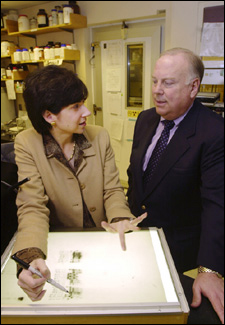Gene needed for puberty discovered
…and Harry Potter is involved

If your Harry Potter gene doesn’t work, you can’t reach puberty. That’s what researchers at Harvard University and in England have discovered.
The gene makes a protein necessary to trigger a hormonal cascade that flows from the brain to the gonads. Without it, the researchers have shown, humans and mice do not become sexually mature.
Stephanie Seminara, an assistant professor of medicine at Harvard Medical School, called the gene part of “the pilot light of puberty.” The gene’s protein apparently regulates an area deep in the brain, which secretes a hormone known as GnRH. The hormone in turn stimulates the reproductive cascade that eventually signals the ovaries or testes to release estrogen or testosterone.
Seminara and other Harvard investigators searched for the gene for many years before identifying it in a Saudi family. Mutations in the gene have prevented many members of that family from undergoing puberty. The researchers also found mutations in the gene in an unrelated black man from the United States who failed to achieve puberty.
In August, Seminara received a phone call from Paradigm Therapeutics, a biotech company in Cambridge, England, that specializes in knocking out genes in mice. The idea is to inactivate a gene and then see what happens to the mouse, thereby determining the function of the gene. The caller said that one of the company’s knockouts had created a mouse that failed to reach puberty.
“He didn’t give me the name of this gene, and I didn’t say the name of the gene we were working on,” Seminara recalls. “But we both knew it was the same one.”
Paradigm Therapeutics has a tradition of naming its knockout genes after famous orphans, because their function is unknown. The nonpubertal gene was christened Harry Potter after the popular boy wizard.
“It was a wonderful synergy, biologically and personally,” Seminara comments. “I have a 4-year-old son who is a big Harry Potter fan. He dressed up as Harry Potter for Halloween.”
First rung on the ladder
No one believes that this gene, officially called GPR54, is the only one involved in puberty. However, it clearly is critical, because if you don’t have it, you can’t attain puberty. “It acts at the first rung on the ladder to reproduction,” Seminara says.
Harry Potter seems to wave its biological wand in the hypothalamus, a grape-shaped area deep in the brain. If this activity is blocked or mutated, boys fail to develop deep voices, facial hair, and muscle mass. Their testes fail to grow. Girls’ breasts do not develop and they fail to menstruate. Both are infertile.
Physicians refer to the condition as IHH, a nice acronym that avoids the unspeakable idiopathic hypogonadotropic hypogonadism. The condition can be treated by injections of GnRH (gonadotropic-releasing hormone), a treatment pioneered by William Crowley, chief of the Reproductive Endocrine Unit at Massachusetts General Hospital, where Seminara works.
Complete loss of puberty is rare; only about one in every 25,000 people – or roughly 200,000 worldwide – live with it. However, doctors see many disorders every day that may involve the same biology. For example, many more kids show up in their offices with delayed puberty, or the opposite, precocious puberty. It’s not uncommon for female athletes or girls with eating disorders to lose their menstrual periods.
“This research has a lot of medical relevance,” Seminara notes. Finding effective ways to suppress the reproductive cascade could lead to more effective contraceptives as well as to better treatments for precocious puberty. Drugs that stimulate puberty might play a role in treating infertility. Some drugs currently used to treat these disorders are given by injection, which is less preferable than taking pills.
“Finding this new pathway in reproductive biology gives us hope that we can develop more effective or more convenient drugs that target different systems than those now in use,” Seminara says.
Another, less obvious byproduct of studying the puberty gene could be new cancer treatments. The GPR54 protein also attaches itself naturally to another protein called metastan, an activity that’s thought to suppress the spreading of cancer cells. Clearer understanding about the mechanism of puberty could open the way to better treatments for hormone-dependent cancers, like those of the breast and prostate.
Exciting questions
Seminara, Crowley, and their colleagues worked for years to understand the central control mechanisms of reproduction before getting their big break. A research fellow from Kuwait who trained at their unit provided it after he went back home. In his medical practice, he met a family from Saudi Arabia that included many members of both sexes who failed to undergo puberty. The Kuwaiti doctor sent blood samples back to Massachusetts General Hospital. There, the research team found mutations in the gene that contains the code for producing the puberty protein.
They also found mutations of the same gene in blood from an African-American man. The mutation in his GPR54 gene, like those in the Saudi family, does not show up in the genes of people who undergo a normal puberty. A report of how the investigations were conducted and the results obtained appears in the Oct. 23 issue of The New England Journal of Medicine.
The researchers are now trying to hash out more details of puberty. What regulates the activity of the Harry Potter gene? Exactly how does it work in the brain to turn on the needed cascade of hormones? What other genes and proteins play a role in the process of reproduction? “We have a lot of exciting questions to answer,” Seminara notes.
In the meantime, the team can enjoy the results of what they have accomplished so far. “It looks like we have found a key genetic gatekeeper of puberty on both mice and men,” says Crowley.




